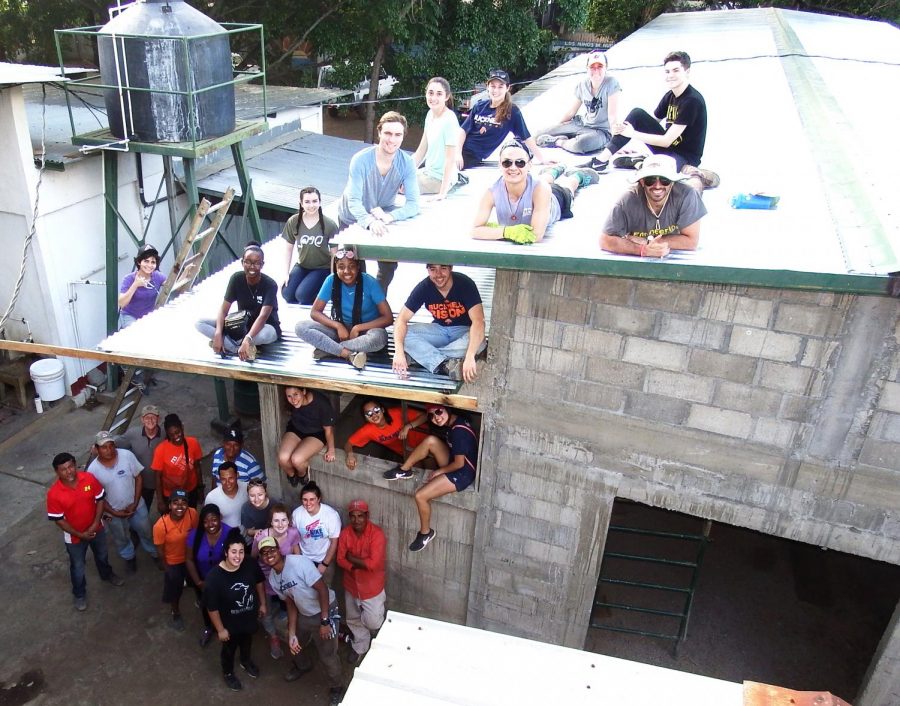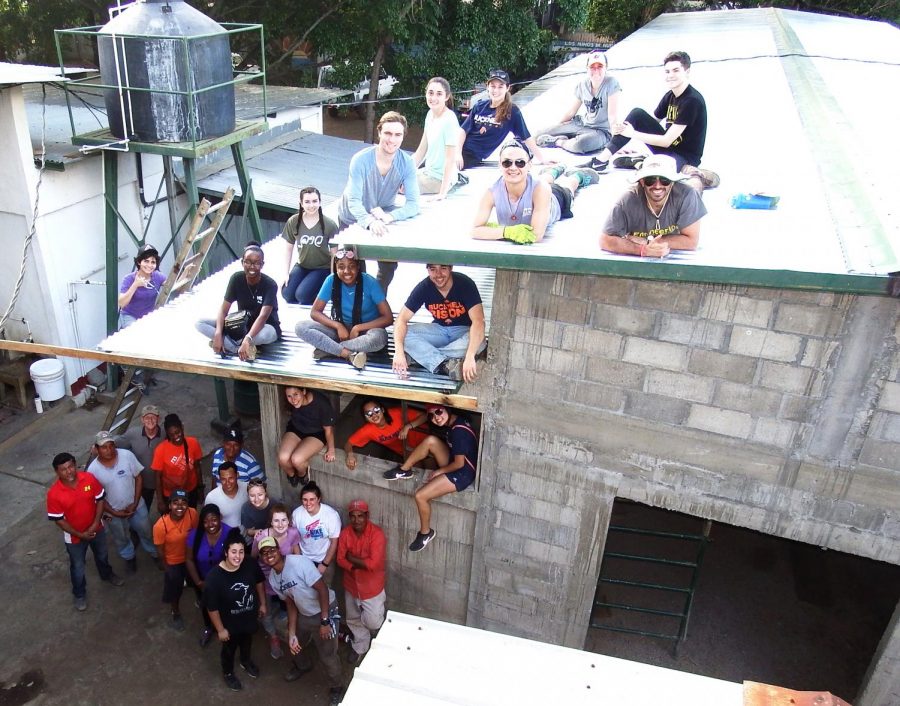Letter to the Editor: ‘Brigade’ trip to Nicaragua humbles, amazes participants
February 1, 2018
Since 1999, when a group of volunteers spent their spring break providing emergency relief efforts following the devastation of Hurricane Mitch, the University has been involved in a unique partnership with a resettlement community outside the capital city of Managua, Nicaragua. Participants in this student-initiated service-learning project help raise funds for a free health clinic in Nueva Vida, a facility built largely with donations secured by the University’s Brigade organization.
Twice per year, students and staff travel to Nicaragua to deliver medicine, offer translation support and other services at the clinic and pharmacy, and to provide physical labor for projects identified by the Jubilee House Community – Center for Development in Central America (JHC-CDCA) — our host agencies.
We arrived Jan. 8 in Managua, Nicaragua with a total of 22 students and two faculty members. We were warmly welcomed by the JHC-CDCA, which brought smiles to everyone’s faces. We had the great opportunity to meet some locals and visited some amazing historical sites, such as, the National Palace where we learned about the Sandinista Revolution. Breathing in the history, we were awed at how revolutionaries aged younger than ourselves sacrificed everything for the cause they believed in.
We ended our day with a trip to the home of Gerardo Arias, a Nicaraguan muralist who, with the help of University students, had created the mural at the entrance of our Craft Center to commemorate the University’s partnership with the Nicaraguan community. It was a very humbling experience and we were moved by the passion that Gerardo expressed when talking about his art work.
Monday, on our first day of work we had a short orientation at Nueva Vida health clinic, where we explored the facility and observed the specific services that are available to the community. We also learned about the history of the JHC-CDCA specifically, their involvement in sustainable agriculture, economic development, and health care. Some students volunteered to shadow Dr. Cassie Iutzi on her home visits around Nueva Vida. Students met with five patients, most of whom had high blood pressure, diabetes, or asthma. Dr. Iutzi explained how the environment and the food they have access to are big causal factors of most of the health issues faced by people in the area. It was interesting to see how their healthcare system was very different from what we see in the United States.
After two days of working at Nueva Vida Health Clinic, laying cinder blocks, drilling zinc sheets to complete the roof, and many other important tasks, we went to El Porvenir, a community of 51 families that live on top of a mountain and operate a coffee cooperative. The machinery for the coffee processing plant was built in 1920 and still works in its original form. The University’s dining services actually purchases coffee from this small cooperative and most of the coffee supplied on campus benefits the Brigade and the El Porvenir coffee co-op. It was interesting to learn about how the community has established their own sustainable living so isolated from the main cities of Nicaragua. Unfortunately, the director of the cooperative claimed they were potentially looking to sell because of the trouble they have had exporting in the past few years due to the large size of the coffee grain.
Climate change has also had a negative impact on their growing capacity. He explained how, because of the middle man system that they are trying working away from, they are not receiving sufficient funds for the amount of intensive physical work to create the product.
Thursday morning, we began our day with an experiment. We were tasked with a shopping challenge in which we were given 200 cordobas (roughly $7) to purchase enough food for a normal Nicaraguan family (four to six individuals) to last a week. Immediately, it became clear that we would be unable to accomplish the task without some impressive bartering skills. After the task, we reflected on the experience in the market. In Nicaragua, a family is expected to eat on $1 or less a day. This means smaller, economical meals, probably only once a day — a drastic difference from what we know about American poverty.
Friday, on our final day of work at the clinic, some Brigadistas finished laying the rooftop, while others spent the day digging a downward sloping trench for the sewage pipe in the new building. Janice Butler, director of civic engagement and one of the Brigade leaders, spoke to the head of the construction staff who told her, “he had not expected us to complete this much work in only one week.” We finished with thirty minutes left in our work day. In such a short time, we were able to create meaningful relationships with the people we learned from and worked with.
On our last day in Nicaragua, we first went to the Masaya Volcano — a national park with both an active and an extinct volcano. We were able to get relatively close to the crater of the volcano and see lava thousands of feet below the billowing smoke and fumes.
We then drove to San Juan de Oriente, where we arrived at the home of Pedro Guerrero, a fifth generation potter, who has received a multitude of awards for his creations from all over the world. Guerrero began by giving us a demonstration of how he would typically go about creating pieces, and then we were given the opportunity to purchase pottery from his collection. We finished the day by visiting Laguna de Apoyo, a lake that fills a former volcano crater, where many of us swam and enjoyed the beautiful mid-day weather on the beach.
Overall, this trip was amazing. We have learned so much and really enjoyed every moment spent in Nicaragua. A major takeaway from this service-learning trip is that everyone has a story to share and it is important that we learn from others, listen to others, feel for others, and, most importantly, love one another. As we continue to fundraise for subsequent trips, we encourage other University students to take part in this experience and be mindful of communities that would appreciate their support.
Sincerely,
The January Brigade 2018 (Trey Johnson ’18, Effiem Obasi ’20, Maha Kourikchi ’18, Ryan Wilde ’18, Nicole Fry ’18, Diego Aldana ’18, Cara English’18, Olivia Garvey ’18, Christine Kehrli ’18, Shirah Moffatt-Darko ’18, Allan La ’18, Brandon Mills ’20, Eve Lukowski ’18, Ivy Jin ’21, Jess Mount ’21, Leonard Orozco ’18, Lisa Francomacaro ’18, Mackenzie Todd ’18, Maddie Minneci ’18, Nancy Ingabire Abayo ’19, Shannon Love ’21, Trevana Eades ’18)























